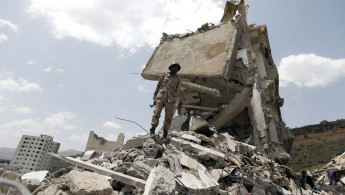Don't leave Saudi-backed commission to probe Yemen abuses, UN says
Saudi Arabia should not be left to investigate human rights violations in war-torn Yemen, the United Nations said.
Riyadh, which has directly killed thousands of civilians in an ongoing war against Houthi rebels in Yemen, should not be left to investigate those same crimes and the job should be taken up by the UN Human Rights Council, a report published on Tuesday said.
“I ...join you in asking why the members of the Human Rights Council are not taking their responsibility and their membership to this body seriously,” the office’s head of Middle East and North Africa, Mohammad Ali Alnsour, told a news conference.
This was the third time the Council was being asked to set up an investigation, Alnsour said.
“That would really put pressure on the conflicting parties to adhere to the rules and the obligations under humanitarian law,” he said.
Two-and-a-half-years of a Saudi-led military intervention has left more than 10,000 people dead, mainly civilians killed by ongoing coalition airstrikes across the country, according to UN figures.
But the 47-nation council has yet to take on the task to investigate ongoing atrocities in what it called an “entirely man-made catastrophe”, leaving the job to Yemen’s National Commission, which reports to President Abedrabbo Mansour Hadi.
Hadi, who is staunchly backed by Saudi Arabia, has been located in Riyadh since Houthi rebels overtook large parts of Yemeni territories in September 2014.
The UN report said Yemen’s National Commission was detrimentally affected by “political constraints”.
“The perceived partiality of the National Commission and its limited access have prevented it from executing its mandate comprehensively,” it said.
“In addition... (it) appears to be lacking any instrument, or mandate, that would enable it to channel its findings into a credible accountability mechanism.”
'100 percent Saudi funding'
The comments came just a day after a top UN official said Saudi Arabia should provide all humanitarian aid to address rampant disease and hunger in Yemen.
"Saudi Arabia should fund 100 percent of the humanitarian crisis in Yemen," David Beasley, Executive Director of the World Food Programme (WFP) said on Monday.
"Either stop the war or fund the crisis. Option three is, do both of them," he added.
It comes as data from the World Health Organisation and Yemen’s health ministry showed the deadly cholera outbreak has infected 612,703 people and killed 2,048 since it began in April, and some districts are still reporting sharp rises in new cases.





 Follow the Middle East's top stories in English at The New Arab on Google News
Follow the Middle East's top stories in English at The New Arab on Google News


